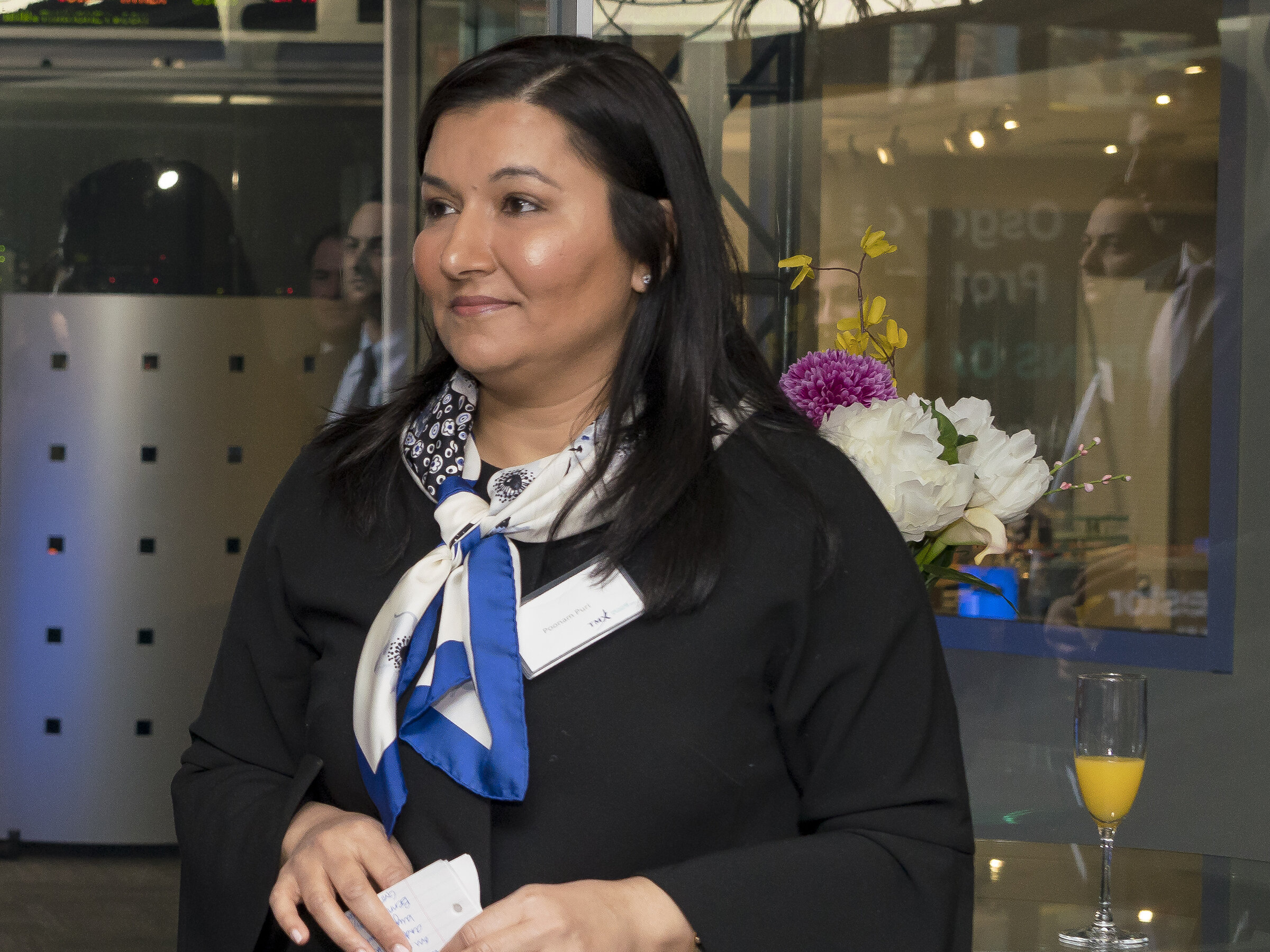GRANT’S DESI ACHIEVER
LAW IS A FORCE FOR GOOD
Professor Poonam Puri.
By SHAGORIKA EASWAR
Professor Poonam Puri, one of Canada’s leading experts in corporate governance, corporate law and securities law, received the Law Society Medal this year for her outstanding career achievements and her contributions to the community.
Reacting to the recognition, she says, “It’s an honour. It’s the highest recognition from the Law Society and to be among other such influential leaders – you can imagine my mom’s pride!”
This was only the latest in a long list of awards for one of Canada’s most prominent legal scholars. Professor Puri has been recognized as one of the top 25 most influential lawyers in Canada by Canadian Lawyer magazine in both 2017 and 2015.
She is a recipient of Canada’s Top 40 under 40 award and Canada’s Most Powerful Women: Top 100 Award.
A Professor of Law at Osgoode Hall Law School, York University, since 1997, Professor Puri has also received several prestigious fellowships, including a 2016 Pierre Elliott Trudeau Foundation Fellowship, and has received significant government funding for her research including five SSHRC grants.
Professor Puri’s record of obtaining these grants is evidence of the influence of her research.
She has co-authored/co-edited close to 100 books, book chapters, scholarly articles in leading journals, and commissioned research reports.
She has presented at over 200 invited keynotes, conferences and public addresses in Canada and around the world.
Her research has led to significant policy and regulatory reform in Canada and abroad. She has worked closely with various government agencies, including the Ontario Ministry of Finance, the Treasury Board Secretariat, Industry Canada and the International Finance Corporation of the World Bank.
“My focus is on ways to promote the economy and also, at the same time, ensure that vulnerable individuals are protected,” she says.
She is currently working with a team at University of Toronto to put together a model for a digital loonie – digital currency issued by the Canadian government – for Bank of Canada. Professor Puri’s role is to design the legal, regulatory and policy framework underpinning the digital currency. If enacted, it could be one of the first in the world.
Professor Puri has also done a lot of work on white collar crime and has published a book on the Enron scandal and integrity and accountability in financial reporting.
White collar crime, she explains, can range from Bernie Madoff and Enron – egregious financial crimes that affect millions – to individuals who cheat others out of smaller amounts.
“When most of us think of the Criminal Code, we think of physical harm, but it’s important to emphasize that financial harm can also be devastating. One can lose their retirement savings or their life savings, all in the blink of an eye, the swoosh of a signature or the click of a mouse.”
A lot of her work has focused on investor protection for ordinary investors in the capital markets.
In 2015, she hosted a conference at which leading scholars, regulators and directors talked about ways to improve investor protection. Discussions at this conference and her trailblazing pro bono efforts to improve access to justice led to the establishment of Osgoode Hall Law School’s Investor Protection Clinic, with seed funding from the Law Foundation of Ontario. It’s the first of its kind in Canada and, as a child of immigrants herself, she brings a particular degree of empathy to the plight of newcomers.
“My parents taught me to serve others and the work of the Osgoode Investor Protection Clinic ties in with my research and teaching interests,” she says. “People hear ‘investor’ and think high net worth, but people of modest means can be affected, too. The clinic helps ordinary investors, those who can’t afford a lawyer’s hourly rates. We see a number of individuals and families, newcomers among them, whose first language may not be English, who may have been defrauded, sometimes by members of their community.”
The clinic regularly receives heartfelt thanks from clients who have been helped by the student caseworkers. One such letter, recently received by Professor Puri, thanks the team for their guidance, support and excellent service. The following is an excerpt:
“The IPC team have made the entire process smooth and less stressful for us. You all have been amazing throughout this journey. You’ve not only exhibited due diligence, expertise, unbiased guidance, professionalism and honesty, but also provided emotional support and empathy. You’ve made this long challenging journey easier to cope with as you accompanied us through the entire process until the end. ”
Many who have been helped wish to donate to the Clinic so others in similar stressful situations can benefit from the Clinic’s services.
Professor Puri’s current research focuses on exploring and developing creative policy and legal solutions to hold multinational corporations more accountable for their actions when they cause harm to individuals and communities. Think of all the factory employees who lost their lives in the horrific Rana Plaza blaze in Bangladesh, for example, or manufacturers who use supply chains with child labour. The legal tool to hold these companies accountable is called “piercing the corporate veil”.
“How can we hold Canadian parent companies more accountable for the actions of their foreign or domestic subsidiaries? If a subsidiary has no funds, where do those who have been harmed go? When can they reasonably look to the parent company for compensation? I am tracking some very important cases that are making their way through the Canadian courts on exactly this issue.”
Professor Puri’s work ethic, success and drive for impact and social change are rooted in her childhood.
Born in New Delhi, she came to Canada at the age of three when her parents immigrated.
Her father worked in the Indian Administrative Service and they weren’t really looking to move, she says. Her mamaji (mother’s brother), who was already in Canada, sponsored both his sisters’ families. Both went for the immigration interviews. Her masi’s (mother’s sister) family didn’t make it, but her parents did, as luck would have it, and they made their way to Canada.
Though she doesn’t recall feeling any different as a child, the weather was an obvious challenge for the family. In the initial years, her parents also struggled with the social isolation, used as they were to a different lifestyle and pace of life in Delhi. Her father worked in title searching with her uncle at first and then opened his own firm.
“That was my exposure to law. That’s how I ended up in law school!” Professor Puri says, adding wistfully that she wishes he were here to see her now.
“My focus is on ways to promote the economy and ensure that vulnerable individuals are protected,” says Professor Puri.
She studied law at the University of Toronto, did her Master’s (LLM) at Harvard, and was called to the Bar in 1999.
Offered a tenure-track professorship at York University when she was just 25, she’s been teaching and mentoring students since, having served as both Associate Dean and Associate Dean, Research, Graduate Studies and Institutional Relations at Osgoode. She has also chaired Osgoode’s Faculty Council, the law school’s governing body, several times.
“I love working with students. I love to see their enthusiasm, energy and creativity. I love my research. It’s very rewarding when my analysis is helpful and part of the debate when we are considering public policy change, when we are able to guide organizations to ensure success.”
Professor Puri has balanced her sterling career with a full family life as well. She met her husband during their first year at UofT. He practised law before moving to banking, and the couple have three children, aged 18, 15 and 14.
The flexibility the law school offered her in terms of setting her own schedule allowed her to be present for her children when they were growing up, she says.
“I have a home office, I’ve always had a home office. Most lawyers are working from home now, but I’ve been doing it for years! But even when I’ve had to travel for work, I’ve made it work with support at home. I went to Nigeria with the International Finance Corporation of the World Bank when my oldest daughter was just 18 months old. I was able to do that because loving grandparents stepped in and because we had amazing caregivers.”
There, she worked to reinstitute the government bond market. It was, as it often is in such cases, behind the scenes, and with little public acknowledgement.
And she’s okay with that, says Professor Puri. “My perspective is that I was doing work that was helpful to society. It’s been several years now and I know it has had impact.”
Her workload is huge, but it doesn’t feel like work, she says, because she’s so passionate about what she does. And for fun, she enjoys skiing and cycling.
“Given that I am at my desk for much of the day, each day, it’s good to get out and get some exercise!”
Professor Puri’s story as a child of immigrants is one of many. But her success stands out. She tells newcomers, particularly women who seek her guidance, to work hard.
“You may have to work twice as hard as a woman, as a person of colour, as an immigrant. Don’t lose sight of who you are and of your culture. In Canada, we’re fortunate that we are able to honour our heritage while being a part of the Canadian mosaic.”
She stresses the importance of maintaining a circle of supportive family and friends while also looking for ways to expand the network.
“Look beyond your natural circle. This leads to interesting opportunities you may not have envisioned.”
The Investor Protection Clinic can be reached at ipc@osgoode.yorku.ca or 416-736-5538.
• Grant’s is proud to present this series about people who are making a difference in the community. Represented by PMA Canada (www.pmacanada.com).


